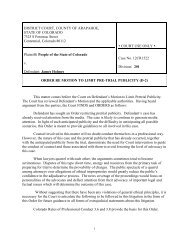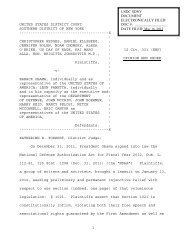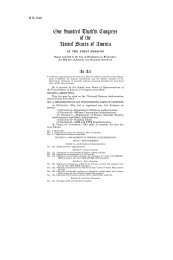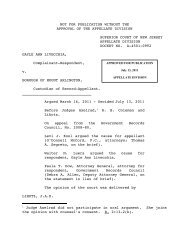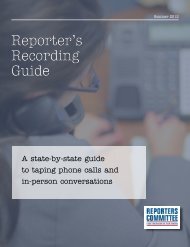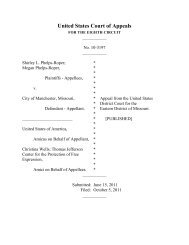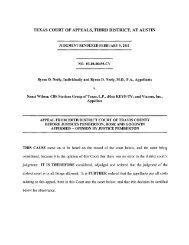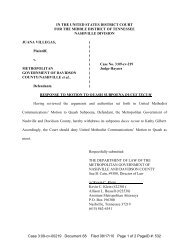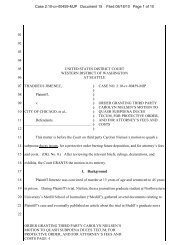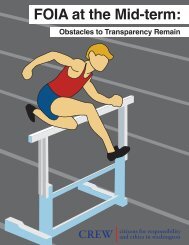filed a friend-of-the-court brief - Reporters Committee for Freedom of ...
filed a friend-of-the-court brief - Reporters Committee for Freedom of ...
filed a friend-of-the-court brief - Reporters Committee for Freedom of ...
You also want an ePaper? Increase the reach of your titles
YUMPU automatically turns print PDFs into web optimized ePapers that Google loves.
UNITED STATES DISTRICT COURT<br />
FOR THE DISTRICT OF DELAWARE<br />
DELAWARE COALITION FOR<br />
OPEN GOVERNMENT, INC.,<br />
Plaintiff,<br />
v. No. 1:11-cv-01015-MAM<br />
THE HON. LEO E. STRINE, JR.,<br />
THE HON. JOHN W. NOBLE,<br />
THE HON. DONALD F. PARSONS, JR.,<br />
THE HON. J. TRAVIS LASTER,<br />
THE HON. SAM GLASSCOCK, III,<br />
THE DELAWARE COURT OF CHANCERY,<br />
AND THE STATE OF DELAWARE,<br />
Defendants.<br />
BRIEF AMICI CURIAE OF THE REPORTERS COMMITTEE FOR FREEDOM<br />
OF THE PRESS AND FIVE NEWS ORGANIZATIONS IN SUPPORT OF PLAINTIFF’S<br />
OPPOSITION TO DEFENDANTS’ MOTION FOR JUDGMENT ON THE PLEADINGS<br />
AND PLAINTIFF’S CROSS-MOTION FOR JUDGMENT ON THE PLEADINGS<br />
William W. Erhart<br />
William W. Erhart, P.A.<br />
1011 Centre Road, Suite 117<br />
Wilmington, DE 19805<br />
Tel: (302) 651-0113<br />
erhart@erhartlaw.com<br />
Counsel <strong>for</strong> amici curiae The <strong>Reporters</strong><br />
<strong>Committee</strong> <strong>for</strong> <strong>Freedom</strong> <strong>of</strong> <strong>the</strong> Press,<br />
American Society <strong>of</strong> News Editors,<br />
The Associated Press, Maryland D.C.<br />
Delaware Broadcasters Association,<br />
The New York Times Company and<br />
The Washington Post<br />
Lucy A. Dalglish<br />
Gregg P. Leslie<br />
Kristen Rasmussen<br />
The <strong>Reporters</strong> <strong>Committee</strong> <strong>for</strong><br />
<strong>Freedom</strong> <strong>of</strong> <strong>the</strong> Press<br />
1101 Wilson Blvd., Suite 1100<br />
Arlington, VA 22209<br />
Tel: (703) 807-2100<br />
ldalglish@rcfp.org<br />
Of Counsel<br />
* Additional counsel listed on following page
* Additional amici counsel:<br />
Kevin M. Goldberg<br />
Fletcher, Heald & Hildreth, PLC<br />
1300 N. 17th St., 11th Floor<br />
Arlington, VA 22209<br />
Counsel <strong>for</strong> American Society <strong>of</strong><br />
News Editors and Maryland D.C.<br />
Delaware Broadcasters Association<br />
Karen Kaiser<br />
Associate General Counsel<br />
The Associated Press<br />
450 W. 33rd Street<br />
New York, NY 10001<br />
George Freeman<br />
David McCraw<br />
V.P./Assistant General Counsels<br />
The New York Times Company<br />
620 Eighth Avenue<br />
New York, NY 10018<br />
Eric N. Lieberman<br />
James A. McLaughlin<br />
The Washington Post<br />
1150 15th St., NW<br />
Washington, DC 20071
TABLE OF CONTENTS<br />
TABLE OF AUTHORITIES .......................................................................................................... ii<br />
STATEMENT OF INTEREST ....................................................................................................... 1<br />
ARGUMENT .................................................................................................................................. 1<br />
I. Settlement agreements in <strong>the</strong> Chancery Court are judicial records subject to a right <strong>of</strong><br />
public access that is balanced against <strong>the</strong> interests <strong>of</strong> <strong>the</strong> parties involved. ........................ 2<br />
II. Courts must independently determine whe<strong>the</strong>r judicial records, including settlement<br />
agreements, should be sealed, notwithstanding <strong>the</strong> existence <strong>of</strong> <strong>court</strong> rules or private<br />
agreements requiring confidentiality. .................................................................................. 7<br />
III. Private settlement agreements subject to confidentiality orders potentially pose significant<br />
risks to public health and safety. .......................................................................................... 9<br />
CONCLUSION ............................................................................................................................. 14<br />
CERTIFICATE OF SERVICE<br />
i
TABLE OF AUTHORITIES<br />
Cases<br />
Baker v. Dolgencorp, Inc.<br />
No. 2:10cv199, 2011 WL 166257 (E.D. Va. Jan. 19, 2011) ....................................................... 4<br />
Bank <strong>of</strong> Am. Nat’l Trust & Sav. Ass’n v. Hotel Rittenhouse Assocs.<br />
800 F.2d 339 (3d Cir. 1986) ................................................................................................ 4, 7–8<br />
Brown & Williamson Tobacco Corp. v. FTC<br />
710 F.2d 1165 (6th Cir. 1983) ..................................................................................................... 8<br />
Brown v. Advantage Eng’g, Inc.<br />
960 F.2d 1013 (11th Cir. 1992) ........................................................................................... 12–13<br />
Enprotech Corp. v. Renda<br />
983 F.2d 17 (3d Cir. 1993) .......................................................................................................... 4<br />
Globe Newspaper Co. v. Superior Court<br />
457 U.S. 596 (1982) .................................................................................................................. 13<br />
Hens v. Clientlogic Operating Corp., No. 05-CV-381S<br />
2010 WL 4340919 (W.D.N.Y. Nov. 2, 2010) ............................................................................. 4<br />
In re Sept. 11 Litig.<br />
723 F. Supp. 2d 526 (S.D.N.Y. 2010) ..................................................................................... 5–6<br />
Jessup v. Lu<strong>the</strong>r<br />
277 F.3d 926 (7th Cir. 2002) ....................................................................................................... 8<br />
K.S. v. Ambassador Programs, Inc.<br />
No. 1:10CV439, 2010 WL 3565481 (E.D. Va. Sept. 3, 2010) ................................................... 4<br />
LEAP Sys., Inc. v. MoneyTrax, Inc.<br />
638 F.3d 216 (3d Cir. 2011) .................................................................................................... 3, 5<br />
Nixon v. Warner Commc’ns, Inc.<br />
435 U.S. 589 (1978) .......................................................................................................... 2 & n.1<br />
Pansy v. Borough <strong>of</strong> Stroudsburg<br />
23 F.3d 772 (3d Cir. 1994) ...................................................................................................... 3–4<br />
Platypus Wear, Inc. v. U.S. Fid. & Guar. Co.<br />
No. 09CV2839 JLS (WVG), 2010 WL 4281805 (S.D. Cal. Oct. 25, 2010) ............................... 4<br />
Press-Enterprise Co. v. Superior Court<br />
464 U.S. 501 (1984) ........................................................................................................ 2 n.1, 12<br />
ii
Richmond Newspapers, Inc. v. Virginia<br />
448 U.S. 555 (1980) ............................................................................................................ 11–12<br />
State Farm Fire & Cas. Co. v. Hood<br />
No. 2:07-cv-188(DCB)(MTP), 2010 WL 3522445 (S.D. Miss. Sept. 2, 2010) ...................... 4–5<br />
Union Oil Co. v. Leavell<br />
220 F.3d 562 (7th Cir. 2000) ..................................................................................................... 12<br />
Wilson v. Am. Motors Corp.<br />
759 F.2d 1568 (11th Cir. 1985) ................................................................................................... 8<br />
Zurich Am. Ins. Co. v. Rite Aid Corp.<br />
345 F. Supp. 2d 497 (E.D. Pa. 2004) .......................................................................................... 7<br />
Statute<br />
Del. Code Ann. tit. 10, § 349(c) (West 2011) ........................................................................... 3 n.2<br />
Rule<br />
Del. Ct. Chancery R. 98(e).............................................................................................................. 1<br />
O<strong>the</strong>r Authorities<br />
Keith Bradsher, S.U.V. Tire Defects Were Known in ’96 but Not Reported<br />
N.Y. Times, June 24, 2001, at A11, available at 2001 WLNR 3356280 ................................. 10<br />
Matt Carroll et al., Church Allowed Abuse by Priest <strong>for</strong> Years: Aware <strong>of</strong><br />
Geoghan Record, Archdiocese Still Shuttled Him from Parish to Parish<br />
Bos. Globe, Jan. 6, 2002, at A1, available at 2002 WLNR 2612594 ....................................... 10<br />
Matt Carroll et al., Scores <strong>of</strong> Priests Involved in Sex Abuse Cases:<br />
Settlements Kept Scope <strong>of</strong> Issue out <strong>of</strong> Public Eye, Bos. Globe<br />
Jan. 31, 2002, at A1, available at 2002 WLNR 2608621 ......................................................... 10<br />
Barry Siegel, Dilemmas <strong>of</strong> Settling in Secret, L.A. Times<br />
Apr. 5, 1991, at A1, available at 1991 WLNR 3872929 .......................................................... 11<br />
Mat<strong>the</strong>w L. Wald & Keith Bradsher, Judge Tells Firestone to Release Technical Data<br />
on Tires, N.Y. Times, Sept. 28, 2000, at C2, available at 2000 WLNR 3207540 ............... 9–10<br />
Elsa Walsh & Benjamin Weiser, Court Secrecy Masks Safety Issues; Key GM Fuel<br />
Tank Memos Kept Hidden in Auto Crash Suits, Wash. Post, Oct. 23, 1988, at A1 ............ 10–11<br />
iii
STATEMENT OF INTEREST<br />
As set <strong>for</strong>th more fully in <strong>the</strong> accompanying motion <strong>for</strong> leave to file this <strong>brief</strong>, amici have<br />
a strong interest in upholding <strong>the</strong> public’s right to access, monitor and report on <strong>the</strong> proceedings<br />
<strong>of</strong> this nation’s <strong>court</strong> system. The Delaware Court <strong>of</strong> Chancery (“<strong>the</strong> Chancery Court”) rules at<br />
issue in this case raise a significant concern about <strong>the</strong> proper application, or lack <strong>the</strong>re<strong>of</strong>, <strong>of</strong> <strong>the</strong><br />
well-established procedure <strong>court</strong>s must undertake be<strong>for</strong>e sealing <strong>court</strong> proceedings and records<br />
to which <strong>the</strong> First Amendment or common law right <strong>of</strong> access attaches.<br />
Amici appreciate <strong>the</strong> rationale underlying <strong>the</strong> policy <strong>of</strong> confidentiality in private<br />
arbitration proceedings and recognize that <strong>court</strong>s have found no right <strong>of</strong> access to arbitration<br />
proceedings. This jurisprudence, however, does not extend to <strong>the</strong> access right to arbitration<br />
records, namely settlement agreements <strong>filed</strong> with a <strong>court</strong>, which <strong>of</strong>ten reveal serious questions<br />
about public health and safety. Parties concerned about <strong>the</strong> confidentiality <strong>of</strong> in<strong>for</strong>mation<br />
contained in documents related to private arbitration do not have to consent to <strong>the</strong> jurisdiction <strong>of</strong><br />
<strong>the</strong> Chancery Court. But when <strong>the</strong>y do invoke <strong>the</strong> authority <strong>of</strong> a publicly funded <strong>court</strong>, <strong>the</strong> rules<br />
governing confidentiality change, and a presumption in favor <strong>of</strong> openness attaches to <strong>the</strong> records<br />
at issue. As such, amici submit this <strong>brief</strong> in order to urge this Court to ensure that <strong>the</strong> Chancery<br />
Court properly protects <strong>the</strong> public’s right <strong>of</strong> access to <strong>court</strong>-supervised settlement agreements.<br />
ARGUMENT<br />
Courts have held that settlement agreements that are submitted to a <strong>court</strong> <strong>for</strong> ei<strong>the</strong>r<br />
approval or en<strong>for</strong>cement are <strong>court</strong> records subject to disclosure. Beyond requiring <strong>the</strong> Chancery<br />
Court to approve settlement agreements between private parties, its rules also authorize <strong>the</strong> <strong>court</strong><br />
to assist in reaching <strong>the</strong>m, Del. Ct. Chancery R. 98(e), and thus documents <strong>filed</strong> in connection<br />
<strong>the</strong>rewith are judicial records. As such, parties attempting to block public access to <strong>the</strong>se records<br />
1
must justify <strong>the</strong> sealing. See, e.g., Nixon v. Warner Commc’ns, Inc., 435 U.S. 589, 597 (1978)<br />
(“It is clear that <strong>the</strong> <strong>court</strong>s <strong>of</strong> this country recognize a general right to inspect and copy public<br />
records and documents, including judicial records and documents.”) (footnotes omitted); id. at<br />
602 (“Also on respondents’ side is <strong>the</strong> presumption — however gauged — in favor <strong>of</strong> public<br />
access to judicial records.”). 1 Because <strong>the</strong> Chancery Court rules do not accommodate public<br />
access concerns or provide <strong>for</strong> <strong>the</strong> procedural steps necessary to close judicial records from <strong>the</strong><br />
public, <strong>the</strong>y violate <strong>the</strong> public’s right <strong>of</strong> access. Moreover, <strong>the</strong> need <strong>for</strong> a party to make necessary<br />
showings is not obviated by <strong>the</strong> Chancery Court rules’ requirement that arbitration proceedings<br />
be confidential or private agreements to that effect. In fact, <strong>the</strong> strong public interest in access to<br />
in<strong>for</strong>mation about important disputes resolved in <strong>the</strong> Chancery Court <strong>of</strong>ten outweighs <strong>the</strong> parties’<br />
privacy and proprietary interests.<br />
I. Settlement agreements in <strong>the</strong> Chancery Court are judicial records subject<br />
to a right <strong>of</strong> public access that is balanced against <strong>the</strong> interests <strong>of</strong> <strong>the</strong><br />
parties involved.<br />
Defendants make much <strong>of</strong> <strong>the</strong> fact that <strong>the</strong> Chancery Court rules authorize unsealing <strong>of</strong><br />
arbitration records if and when <strong>the</strong> proceedings are appealed to <strong>the</strong> state Supreme Court,<br />
claiming this procedure preserves <strong>the</strong> right <strong>of</strong> public access to <strong>the</strong> records. See D.I. 20 (Defs.’<br />
Opening Br.) 2–3, 6–7, 9, 29–33. However, <strong>the</strong> determination <strong>of</strong> whe<strong>the</strong>r a right <strong>of</strong> access to<br />
1 Where <strong>the</strong> records at issue are subject to <strong>the</strong> common law right <strong>of</strong> access, <strong>court</strong>s must balance<br />
<strong>the</strong> interests <strong>of</strong> <strong>the</strong> parties involved with those <strong>of</strong> <strong>the</strong> public and <strong>the</strong> press. See Nixon v. Warner<br />
Commc’ns, Inc., 435 U.S. 589, 598–99 (1978). Parties seeking to restrict <strong>the</strong> First Amendment<br />
access right must meet a higher burden: establishing a compelling need <strong>for</strong> secrecy and<br />
demonstrating that alternatives to sealing <strong>the</strong> record are inadequate. Press-Enterprise Co. v.<br />
Superior Court, 464 U.S. 501, 510 (1984). Amici take no position on whe<strong>the</strong>r <strong>the</strong> right <strong>of</strong> access<br />
to private settlement agreements is anchored in <strong>the</strong> First Amendment or <strong>the</strong> common law,<br />
namely because <strong>the</strong> Chancery Court’s rules allowing blanket sealing without any showing fail<br />
under ei<strong>the</strong>r standard.<br />
2
settlement agreements exists turns not on whe<strong>the</strong>r <strong>the</strong> parties involved seek review 2 but ra<strong>the</strong>r on<br />
whe<strong>the</strong>r <strong>the</strong> documents are judicial records. Because its rules not only require <strong>the</strong> Chancery<br />
Court to approve <strong>the</strong>se agreements but also authorize it to assist <strong>the</strong> parties in reaching <strong>the</strong>m,<br />
documents <strong>filed</strong> in connection <strong>the</strong>rewith are undoubtedly judicial records subject to <strong>the</strong> right <strong>of</strong><br />
public access. Yet, parties seeking to restrict disclosure may move to do so and are entitled to<br />
limited sealing if <strong>the</strong>y can demonstrate a significant interest in secrecy that outweighs <strong>the</strong> strong<br />
presumption in favor <strong>of</strong> access to <strong>court</strong> documents.<br />
One <strong>of</strong> <strong>the</strong> key factors in a determination <strong>of</strong> whe<strong>the</strong>r settlement agreements may be<br />
sealed is whe<strong>the</strong>r <strong>the</strong> documents are <strong>filed</strong> with <strong>the</strong> <strong>court</strong> or presented to it <strong>for</strong> en<strong>for</strong>cement or<br />
interpretative guidance, and thus are judicial records. The U.S. Court <strong>of</strong> Appeals <strong>for</strong> <strong>the</strong> Third<br />
Circuit has made clear that in such cases, <strong>the</strong> agreements are indeed <strong>court</strong> records subject to<br />
disclosure. Last year, <strong>the</strong> Third Circuit affirmed a trial <strong>court</strong>’s holding that private parties’<br />
confidential settlement, <strong>the</strong> terms <strong>of</strong> which <strong>the</strong> judge read into <strong>the</strong> record at <strong>the</strong> parties’ request,<br />
was a judicial record subject to <strong>the</strong> presumption <strong>of</strong> openness. LEAP Sys., Inc. v. MoneyTrax, Inc.,<br />
638 F.3d 216, 220–21 (3d Cir. 2011). Not only was <strong>the</strong> transcript <strong>filed</strong> with <strong>the</strong> <strong>court</strong> clerk and<br />
listed on <strong>the</strong> <strong>court</strong>’s docket, <strong>the</strong> parties specifically asked <strong>the</strong> <strong>court</strong> to retain jurisdiction over <strong>the</strong><br />
dispute to interpret and en<strong>for</strong>ce <strong>the</strong> terms <strong>of</strong> <strong>the</strong> settlement agreement. Id.; see also Pansy v.<br />
Borough <strong>of</strong> Stroudsburg, 23 F.3d 772, 781 (3d Cir. 1994) (holding that a settlement agreement<br />
that was never <strong>filed</strong> with, interpreted or en<strong>for</strong>ced by <strong>the</strong> <strong>court</strong>, which also had not ordered<br />
2 Defendants’ assertion is particularly nonsensical when applied to settlement agreements, which<br />
presumably may not be appealed to <strong>the</strong> Supreme Court and thus not publicly <strong>filed</strong>. See Del. Code<br />
Ann. tit. 10, § 349(c) (West 2011) (authorizing <strong>the</strong> filing with <strong>the</strong> Supreme Court <strong>of</strong> applications<br />
to vacate, stay, or en<strong>for</strong>ce an arbitration award <strong>of</strong> <strong>the</strong> Chancery Court). Under this <strong>the</strong>ory, all<br />
settlement agreements reached in <strong>the</strong> Chancery Court are shielded from public view, despite <strong>the</strong>ir<br />
approval by <strong>the</strong> judicial arbitrator.<br />
3
compliance with any <strong>of</strong> <strong>the</strong> agreement’s terms, was not a judicial record); Enprotech Corp. v.<br />
Renda, 983 F.2d 17, 20 (3d Cir. 1993) (same); Bank <strong>of</strong> Am. Nat’l Trust & Sav. Ass’n v. Hotel<br />
Rittenhouse Assocs., 800 F.2d 339, 343 (3d Cir. 1986) (holding that <strong>the</strong> common law<br />
presumption <strong>of</strong> access applied to a settlement agreement <strong>filed</strong> and submitted to <strong>the</strong> <strong>court</strong> <strong>for</strong><br />
approval).<br />
Lower <strong>court</strong>s likewise consider a <strong>court</strong>’s role, if any, in private arbitration when<br />
evaluating whe<strong>the</strong>r a settlement agreement is a judicial record subject to disclosure. See, e.g.,<br />
Baker v. Dolgencorp, Inc., No. 2:10cv199, 2011 WL 166257, at *2 (E.D. Va. Jan. 19, 2011)<br />
(holding that settlement agreements under <strong>the</strong> Fair Labor Standards Act trigger <strong>the</strong> common law<br />
right <strong>of</strong> public access because <strong>the</strong> <strong>court</strong>s are charged with <strong>the</strong> responsibility <strong>of</strong> scrutinizing <strong>the</strong>m<br />
<strong>for</strong> fairness, an evaluation that clearly is a judicial act); Hens v. Clientlogic Operating Corp., No.<br />
05-CV-381S, 2010 WL 4340919, at *2 (W.D.N.Y. Nov. 2, 2010) (same); Platypus Wear, Inc. v.<br />
U.S. Fid. & Guar. Co., No. 09CV2839 JLS (WVG), 2010 WL 4281805, at *1, *2 (S.D. Cal. Oct.<br />
25, 2010) (holding that a <strong>court</strong> transcript containing <strong>the</strong> terms <strong>of</strong> a settlement was a <strong>court</strong><br />
document to which a presumption <strong>of</strong> public access attached and noting that while settlement<br />
discussions are confidential <strong>for</strong> important reasons, settlement terms are not subject to <strong>the</strong> same<br />
public policy consideration); K.S. v. Ambassador Programs, Inc., No. 1:10CV439, 2010 WL<br />
3565481, at *2 n.6 (E.D. Va. Sept. 3, 2010) (holding that various filings reflecting <strong>the</strong> terms <strong>of</strong><br />
<strong>the</strong> judicially approved settlement in a personal injury case involving a minor plaintiff were,<br />
without question, judicial records because <strong>the</strong>y adjudicated substantive rights and served as a<br />
substitute <strong>for</strong> trial); State Farm Fire & Cas. Co. v. Hood, No. 2:07-cv-188(DCB)(MTP), 2010<br />
WL 3522445, at *2 (S.D. Miss. Sept. 2, 2010) (holding that <strong>the</strong> common law presumption <strong>of</strong><br />
4
access applies to settlement agreements <strong>filed</strong> with <strong>the</strong> <strong>court</strong>, which become part <strong>of</strong> <strong>the</strong> judicial<br />
record).<br />
Defendants and supporting amici assert that finding a right <strong>of</strong> public access to private<br />
arbitration proceedings in <strong>the</strong> Chancery Court would discourage use <strong>of</strong> <strong>the</strong> <strong>for</strong>um by companies<br />
that wish to resolve disputes with o<strong>the</strong>r business entities through confidential arbitration. D.I. 20<br />
(Defs.’ Opening Br.) 29; D.I. 21-1 (Br. <strong>of</strong> Amicus Curiae <strong>the</strong> Corporation Law Section <strong>of</strong> <strong>the</strong><br />
Del. State Bar Association) 13–14; D.I. 27-1 (Br. <strong>of</strong> Amici Curiae NASDAQ OMX Group, Inc.<br />
et al.) 7–8. This claim, however, ignores <strong>the</strong> well-established rule that parties may move to keep<br />
material shielded from public view, and <strong>court</strong>s allow limited sealing where those parties can<br />
show a significant interest in secrecy sufficient to overcome <strong>the</strong> strong presumption in favor <strong>of</strong><br />
access. In <strong>the</strong> 2011 Third Circuit case affirming <strong>the</strong> finding that an access right applied to a<br />
confidential settlement agreement <strong>filed</strong> with <strong>the</strong> <strong>court</strong>, <strong>the</strong> appellate <strong>court</strong> none<strong>the</strong>less ruled that<br />
<strong>the</strong> agreement need not be disclosed to <strong>the</strong> public. LEAP, 638 F.3d at 223. Specifically, <strong>the</strong> <strong>court</strong><br />
held that a party’s reliance on <strong>the</strong> <strong>court</strong>’s assurance that <strong>the</strong> transcript memorializing <strong>the</strong> terms <strong>of</strong><br />
<strong>the</strong> agreement would remain confidential was a significant privacy interest, while <strong>the</strong> public<br />
interest in disclosure was minimal. Id. at 222. Thus, according to <strong>the</strong> <strong>court</strong>, <strong>the</strong> party’s privacy<br />
interest outweighed <strong>the</strong> access right, and <strong>the</strong> strong presumption in favor <strong>of</strong> public accessibility<br />
had been rebutted. Id. at 222–23. 3<br />
Moreover, a U.S. District Court ruled that portions <strong>of</strong> <strong>the</strong> settlement reached in several<br />
property damage cases related to <strong>the</strong> terrorist attacks <strong>of</strong> September 11, 2001, could remain<br />
3 As discussed fur<strong>the</strong>r in Part II, <strong>court</strong>s should not, and do not, grant sealing requests merely<br />
because <strong>the</strong> records at issue are subject to a private confidentiality agreement or o<strong>the</strong>r assurance<br />
that <strong>the</strong>y will not be disclosed. As such, amici do not cite this case <strong>for</strong> its holding but ra<strong>the</strong>r to<br />
point out that parties seeking to restrict public disclosure to records to which <strong>the</strong> access right<br />
applies have a mechanism whereby <strong>the</strong>y may attempt to do so.<br />
5
shielded from public view. In re Sept. 11 Litig., 723 F. Supp. 2d 526, 533 (S.D.N.Y. 2010). The<br />
<strong>court</strong> considered four categories <strong>of</strong> in<strong>for</strong>mation under seal: 1) <strong>the</strong> total settlement amount; 2) <strong>the</strong><br />
amount to be paid by <strong>the</strong> various defendants’ insurers; 3) <strong>the</strong> amount allocated to each plaintiff;<br />
and 4) <strong>the</strong> discovery materials exchanged during <strong>the</strong> settlement process. Id. at 531. Defendants<br />
argued that disclosure <strong>of</strong> in<strong>for</strong>mation in <strong>the</strong> first two categories would have a chilling effect on<br />
<strong>the</strong> settlement prospects <strong>of</strong> o<strong>the</strong>r lawsuits pending against <strong>the</strong>m and would cast defendants in a<br />
false light. Id. at 532. The <strong>court</strong> found <strong>the</strong>se arguments insufficient to outweigh <strong>the</strong> presumption<br />
<strong>of</strong> public access to judicial documents and vacated <strong>the</strong> portion <strong>of</strong> its order that sealed <strong>the</strong><br />
aggregate settlement amount and its allocation among insurers. Id. at 533. In contrast, <strong>the</strong> <strong>court</strong><br />
held that <strong>the</strong> privacy interests <strong>of</strong> <strong>the</strong> plaintiffs overcame <strong>the</strong> right <strong>of</strong> public access to in<strong>for</strong>mation<br />
about <strong>the</strong> allocation <strong>of</strong> settlement proceeds among <strong>the</strong>m. Id. The confidential discovery<br />
documents, according to <strong>the</strong> <strong>court</strong>, did not need to be disclosed because <strong>the</strong>y were nei<strong>the</strong>r relied<br />
on by <strong>the</strong> <strong>court</strong> in its approval <strong>of</strong> <strong>the</strong> settlement nor traditionally accessible to <strong>the</strong> public. Id.<br />
Private settlement agreements must be approved by <strong>the</strong> Chancery Court, which also has<br />
<strong>the</strong> power to assist <strong>the</strong> parties in reaching <strong>the</strong>m. As such, <strong>the</strong>re is no question that documents<br />
<strong>filed</strong> in connection <strong>the</strong>rewith are judicial records subject to a right <strong>of</strong> public access, regardless <strong>of</strong><br />
whe<strong>the</strong>r <strong>the</strong> proceedings are appealed to <strong>the</strong> state Supreme Court. However, parties seeking to<br />
restrict public disclosure may move to do so, and <strong>court</strong>s will allow limited sealing where those<br />
parties can demonstrate a significant interest in secrecy sufficient to overcome <strong>the</strong> strong<br />
presumption in favor <strong>of</strong> public access to judicial records and documents.<br />
6
II.<br />
Courts must independently determine whe<strong>the</strong>r judicial records, including<br />
settlement agreements, should be sealed, notwithstanding <strong>the</strong> existence <strong>of</strong><br />
<strong>court</strong> rules or private agreements requiring confidentiality.<br />
Courts nationwide have rejected <strong>the</strong> premise that <strong>court</strong> rules or private agreements<br />
mandating confidentiality in arbitration proceedings somehow obviate <strong>the</strong> need <strong>for</strong> a party to<br />
make <strong>the</strong> necessary showings required to overcome <strong>the</strong> right <strong>of</strong> public access to judicial records<br />
and documents. While <strong>the</strong> protection <strong>of</strong> parties’ sensitive in<strong>for</strong>mation as a means to promote<br />
effective arbitration may indeed be a significant interest in secrecy, <strong>court</strong> rules and private<br />
agreements that require blanket confidentiality in an attempt to satisfy this interest do not<br />
automatically defeat <strong>the</strong> strong presumption in favor <strong>of</strong> public access to <strong>court</strong> records but instead<br />
are subject to a judicial balancing <strong>of</strong> <strong>the</strong> interests.<br />
In a sua sponte challenge to parties’ agreement that <strong>the</strong> entire <strong>court</strong> file and docket sheet<br />
relating to <strong>the</strong>ir private arbitration, including <strong>the</strong> settlement, a U.S. District Court rejected <strong>the</strong><br />
very argument Defendants advance here: Nei<strong>the</strong>r <strong>the</strong> “confidentiality procedures <strong>of</strong> <strong>the</strong><br />
American Arbitration Association [nor] <strong>the</strong> federal policy <strong>of</strong> encouraging arbitration trump <strong>the</strong><br />
clear law and policy standards established by <strong>the</strong> United State [sic] Supreme Court and <strong>the</strong> Court<br />
<strong>of</strong> Appeals <strong>for</strong> <strong>the</strong> Third Circuit <strong>for</strong> maintaining open and accessible records <strong>of</strong> legal matters <strong>for</strong><br />
public scrutiny.” Zurich Am. Ins. Co. v. Rite Aid Corp., 345 F. Supp. 2d 497, 499, 507 n.3 (E.D.<br />
Pa. 2004). A divided Third Circuit panel likewise held that a party’s claim <strong>of</strong> a generalized<br />
interest in settling lawsuits on confidential terms was not sufficient to support <strong>the</strong> sealing <strong>of</strong> a<br />
settlement agreement submitted to <strong>the</strong> <strong>court</strong> <strong>for</strong> en<strong>for</strong>cement:<br />
Having undertaken to utilize <strong>the</strong> judicial process to interpret <strong>the</strong> settlement and to<br />
en<strong>for</strong>ce it, <strong>the</strong> parties are no longer entitled to invoke <strong>the</strong> confidentiality ordinarily<br />
accorded settlement agreements. Once a settlement is <strong>filed</strong> in <strong>the</strong> district <strong>court</strong>, it<br />
becomes a judicial record, and subject to <strong>the</strong> access accorded such records.<br />
7
Rittenhouse, 800 F.2d at 345.<br />
Amici curiae NASDAQ OMX Group, Inc. et al. seemingly assume that parties’<br />
contractual agreement to maintain <strong>the</strong> confidentiality <strong>of</strong> <strong>the</strong>ir arbitration proceedings is<br />
dispositive on <strong>the</strong> issue <strong>of</strong> whe<strong>the</strong>r records <strong>filed</strong> in connection <strong>the</strong>rewith may be sealed. See D.I.<br />
27-1 (Br. <strong>of</strong> Amici Curiae NASDAQ OMX Group, Inc. et al.) 4 (noting that parties that opt to<br />
arbitrate <strong>the</strong>ir private disputes in <strong>the</strong> Chancery Court “have already contractually agreed that <strong>the</strong>y<br />
believe that public access will harm, not help, <strong>the</strong> functioning <strong>of</strong> <strong>the</strong> arbitration”). However,<br />
where a right <strong>of</strong> access to judicial documents exists, <strong>court</strong>s should not, and do not, allow private<br />
contract rights to per se trump <strong>the</strong> public access right. See, e.g., Jessup v. Lu<strong>the</strong>r, 277 F.3d 926,<br />
929–30 (7th Cir. 2002) (ordering that a judicially approved settlement subject to a private<br />
agreement to keep <strong>the</strong> award confidential be unsealed in part because <strong>the</strong> public “has an interest<br />
in knowing what terms <strong>of</strong> settlement a federal judge would approve”); Wilson v. Am. Motors<br />
Corp., 759 F.2d 1568, 1571 (11th Cir. 1985) (holding that <strong>the</strong> trial <strong>court</strong> abused its discretion in<br />
sealing settlement agreements per <strong>the</strong> parties’ stipulation to such); Brown & Williamson Tobacco<br />
Corp. v. FTC, 710 F.2d 1165, 1178, 1180, 1181 (6th Cir. 1983) (vacating an order sealing a<br />
settlement, <strong>the</strong> parties to which had entered into a confidentiality agreement, noting that <strong>the</strong><br />
desire to shield prejudicial in<strong>for</strong>mation in judicial records from competitors and <strong>the</strong> public<br />
“cannot be accommodated by <strong>court</strong>s without seriously undermining <strong>the</strong> tradition <strong>of</strong> an open<br />
judicial system,” which recognizes <strong>the</strong> public’s need to “analyze and critique <strong>the</strong> reasoning <strong>of</strong> <strong>the</strong><br />
<strong>court</strong>”).<br />
Amici concede that arbitration proceedings on occasion are only effective if <strong>the</strong> parties<br />
are assured that <strong>the</strong>ir sensitive business or private in<strong>for</strong>mation is protected from public disclosure<br />
and recognize that <strong>the</strong> Chancery Court rules are an attempt to provide this guarantee to<br />
8
usinesses that opt to arbitrate <strong>the</strong>ir private disputes in <strong>the</strong> <strong>for</strong>um. Yet, <strong>the</strong> rules’ authorization <strong>of</strong><br />
blanket confidentiality in <strong>the</strong> proceedings and records, including settlement agreements approved<br />
by <strong>the</strong> <strong>court</strong> and perhaps even reached with its assistance, fails to accommodate public access<br />
concerns and thus violates <strong>the</strong> right <strong>of</strong> access to judicial documents. Likewise, private<br />
agreements do not obviate <strong>the</strong> need <strong>for</strong> a party to make <strong>the</strong> necessary showings required to<br />
restrict public access to <strong>the</strong> records.<br />
III.<br />
Private settlement agreements subject to confidentiality orders<br />
potentially pose significant risks to public health and safety.<br />
Settlement agreements <strong>of</strong>ten reveal serious questions about health, safety and o<strong>the</strong>r<br />
important issues that affect <strong>the</strong> public. As such, <strong>the</strong>re is a significant public interest in disclosure<br />
<strong>of</strong> <strong>the</strong> in<strong>for</strong>mation in order to alert consumers to potential dangers posed by products and<br />
services <strong>the</strong>y use. Moreover, <strong>the</strong> public’s interest in monitoring <strong>court</strong>s’ conduct is no less<br />
compelling with regard to private settlement agreements submitted to a <strong>court</strong> <strong>for</strong> approval or<br />
en<strong>for</strong>cement.<br />
Secret settlement agreements prevent health and safety issues, some life-threatening,<br />
from becoming public, <strong>the</strong>reby masking dangers that <strong>the</strong> public, had it known <strong>of</strong> <strong>the</strong>ir existence,<br />
could have more effectively guarded against, as <strong>the</strong> following examples strongly demonstrate:<br />
<br />
U.S. Department <strong>of</strong> Transportation <strong>of</strong>ficials said <strong>the</strong> sealing <strong>of</strong> documents in settled<br />
lawsuits related to rollover deaths in Ford Explorers equipped with Firestone tires that<br />
failed was one reason <strong>the</strong>y did not identify <strong>the</strong> pattern <strong>of</strong> scores <strong>of</strong> such deaths. Mat<strong>the</strong>w<br />
L. Wald & Keith Bradsher, Judge Tells Firestone to Release Technical Data on Tires,<br />
9
N.Y. Times, Sept. 28, 2000, at C2, available at 2000 WLNR 3207540. 4 The tires were<br />
linked to more than 270 deaths nationwide. Keith Bradsher, S.U.V. Tire Defects Were<br />
Known in ’96 but Not Reported, N.Y. Times, June 24, 2001, at A11, available at 2001<br />
WLNR 3356280.<br />
<br />
A Pulitzer Prize-winning investigative report by The Boston Globe revealed that <strong>the</strong><br />
Archdiocese <strong>of</strong> Boston confidentially settled child molestation claims against at least 70<br />
priests over <strong>the</strong> preceding 10 years and thus shielded from public view <strong>the</strong> overwhelming<br />
scope <strong>of</strong> <strong>the</strong> <strong>the</strong>ret<strong>of</strong>ore relatively unknown issue. Matt Carroll et al., Scores <strong>of</strong> Priests<br />
Involved in Sex Abuse Cases: Settlements Kept Scope <strong>of</strong> Issue out <strong>of</strong> Public Eye, Bos.<br />
Globe, Jan. 31, 2002, at A1, available at 2002 WLNR 2608621. A victim who entered a<br />
secret settlement with <strong>the</strong> church in 1995 said he was “ashamed” he did so, noting that<br />
had <strong>the</strong> settlement agreements been publicly disclosed, “this problem would have been<br />
exposed long ago.” Id. Moreover, in <strong>the</strong> case <strong>of</strong> a single priest, Fa<strong>the</strong>r John Geoghan,<br />
more than 130 people over 20 years came <strong>for</strong>ward with accusations <strong>of</strong> sexual abuse. Matt<br />
Carroll et al., Church Allowed Abuse by Priest <strong>for</strong> Years: Aware <strong>of</strong> Geoghan Record,<br />
Archdiocese Still Shuttled Him from Parish to Parish, Bos. Globe, Jan. 6, 2002, at A1,<br />
available at 2002 WLNR 2612594. The church secretly settled at least fifty <strong>of</strong> those<br />
claims. Id.<br />
In Louisiana, attorneys suing Continental Grain Company in connection with a 1977<br />
grain elevator explosion that killed 35 workers learned <strong>of</strong> a company report detailing<br />
safety and fire hazards at ano<strong>the</strong>r elevator in Wisconsin. Elsa Walsh & Benjamin Weiser,<br />
4 To facilitate access to secondary sources, “WLNR,” or Westlaw NewsRoom, citations are<br />
provided whenever possible.<br />
10
Court Secrecy Masks Safety Issues; Key GM Fuel Tank Memos Kept Hidden in Auto<br />
Crash Suits, Wash. Post, Oct. 23, 1988, at A1. In settling <strong>the</strong> case <strong>for</strong> $25 million on<br />
behalf <strong>of</strong> <strong>the</strong> families <strong>of</strong> <strong>the</strong> deceased workers, <strong>the</strong> families’ attorneys agreed to return <strong>the</strong><br />
documents and not to alert anyone to <strong>the</strong> alleged hazards, including workers at <strong>the</strong><br />
Wisconsin facility. Id.<br />
<br />
A U.S. District Court in Florida prohibited an attorney suing <strong>the</strong> drug company Pfizer<br />
Laboratories from disclosing to any government agency, including <strong>the</strong> U.S. Food and<br />
Drug Administration, any in<strong>for</strong>mation he obtained from Pfizer, unless <strong>the</strong> <strong>court</strong> gave<br />
permission. Id. Yet, <strong>the</strong> central allegation in <strong>the</strong> suit was that Pfizer did not issue<br />
adequate warnings about <strong>the</strong> risks <strong>of</strong> Feldene, a prescription painkiller that <strong>the</strong> plaintiff<br />
claimed caused him to bleed internally. Id.<br />
<br />
A Seattle woman sued two local laboratories, claiming <strong>the</strong>y misread her Pap smears and<br />
failed to diagnose advanced cervical cancer, treatment <strong>for</strong> which required <strong>the</strong> 23-year-old<br />
to undergo a radical hysterectomy. Barry Siegel, Dilemmas <strong>of</strong> Settling in Secret, L.A.<br />
Times, Apr. 5, 1991, at A1, available at 1991 WLNR 3872929. Such misdiagnoses were<br />
not uncommon at <strong>the</strong> two labs in question, but secret <strong>court</strong> settlements had obscured <strong>the</strong><br />
extent <strong>of</strong> <strong>the</strong> problem, <strong>the</strong> woman later learned. Id.<br />
Where private settlement agreements are subject to <strong>court</strong> supervision, <strong>the</strong> strong public<br />
interest in being able to serve as a check upon <strong>the</strong> judicial process is implicated. The U.S.<br />
Supreme Court has made clear that <strong>the</strong> open administration <strong>of</strong> justice is <strong>the</strong> Court’s preference<br />
and practice. Public access to <strong>court</strong> proceedings and records reassures <strong>the</strong> public that its<br />
government systems are working properly and correctly and enhances public knowledge and<br />
understanding <strong>of</strong> <strong>the</strong> <strong>court</strong> system. See Richmond Newspapers, Inc. v. Virginia, 448 U.S. 555,<br />
11
570–71 (1980) (plurality opinion) (discussing openness in criminal trials). Allowing such access<br />
“enhances both <strong>the</strong> basic fairness <strong>of</strong> <strong>the</strong> criminal trial and <strong>the</strong> appearance <strong>of</strong> fairness so essential<br />
to public confidence in <strong>the</strong> system.” Press-Enterprise Co. v. Superior Court, 464 U.S. 501, 508<br />
(1984) (citing Richmond Newspapers, 448 U.S. at 569–71). As <strong>for</strong>mer Chief Justice Warren<br />
Burger wrote, “[p]eople in an open society do not demand infallibility from <strong>the</strong>ir institutions, but<br />
it is difficult <strong>for</strong> <strong>the</strong>m to accept what <strong>the</strong>y are prohibited from observing.” Richmond<br />
Newspapers, 448 U.S. at 572. This presumption <strong>of</strong> public access is not, and should not be,<br />
limited to criminal proceedings and records. Writing <strong>for</strong> <strong>the</strong> U.S. Court <strong>of</strong> Appeals <strong>for</strong> <strong>the</strong><br />
Seventh Circuit, Judge Easterbrook explained that a rationale underlying <strong>the</strong> enduring<br />
commitment to open <strong>court</strong>s is to preserve <strong>the</strong>ir legitimacy to <strong>the</strong> public:<br />
Judicial proceedings are public ra<strong>the</strong>r than private property, and <strong>the</strong> third-party<br />
effects that justify <strong>the</strong> subsidy <strong>of</strong> <strong>the</strong> judicial system also justify making records<br />
and decisions as open as possible. What happens in <strong>the</strong> halls <strong>of</strong> government is<br />
presumptively public business. Judges deliberate in private but issue public<br />
decisions after public arguments based on public records. The political branches<br />
<strong>of</strong> government claim legitimacy by election, judges by reason. Any step that<br />
withdraws an element <strong>of</strong> <strong>the</strong> judicial process from public view makes <strong>the</strong> ensuing<br />
decision look more like fiat. . . .<br />
Union Oil Co. v. Leavell, 220 F.3d 562, 568 (7th Cir. 2000) (citations omitted).<br />
The public’s interest in monitoring <strong>the</strong> functioning <strong>of</strong> its <strong>court</strong>s is no less compelling with<br />
regard to documents upon which <strong>court</strong>s rely to make <strong>the</strong>ir decisions. That is, <strong>the</strong> public has a<br />
strong interest in knowing <strong>the</strong> terms <strong>of</strong> a settlement agreement approved or en<strong>for</strong>ced by a <strong>court</strong><br />
in order to evaluate <strong>the</strong> <strong>court</strong>’s invocation <strong>of</strong> its power over <strong>the</strong> settlement. See, e.g, Brown v.<br />
Advantage Eng’g, Inc., 960 F.2d 1013, 1016 (11th Cir. 1992) (“It is immaterial whe<strong>the</strong>r <strong>the</strong><br />
sealing <strong>of</strong> <strong>the</strong> record is an integral part <strong>of</strong> a negotiated settlement between <strong>the</strong> parties, even if <strong>the</strong><br />
settlement comes with <strong>the</strong> <strong>court</strong>’s active encouragement. Once a matter is brought be<strong>for</strong>e a <strong>court</strong><br />
12
<strong>for</strong> resolution, it is no longer solely <strong>the</strong> parties’ case, but also <strong>the</strong> public’s case. Absent a showing<br />
<strong>of</strong> extraordinary circumstances . . . <strong>the</strong> <strong>court</strong> file must remain accessible to <strong>the</strong> public.”).<br />
Lost in secret settlement agreements are <strong>the</strong> early warning signals about defective<br />
products or questionable conduct that <strong>of</strong>ten emerge in public documents. As such, <strong>the</strong> blanket<br />
confidentiality presents significant risks to public health and safety. Moreover, <strong>the</strong> secrecy<br />
deprives <strong>the</strong> public <strong>of</strong> its strong interest in monitoring and evaluating <strong>the</strong> judicial process — “an<br />
essential component in our structure <strong>of</strong> self-government.” Globe Newspaper Co. v. Superior<br />
Court, 457 U.S. 596, 606 (1982) (footnote omitted).<br />
13
CONCLUSION<br />
For <strong>the</strong> <strong>for</strong>egoing reasons, amici curiae respectfully request that this Court deny<br />
Defendants’ motion <strong>for</strong> judgment on <strong>the</strong> pleadings and grant Plaintiff’s cross-motion <strong>for</strong><br />
judgment on <strong>the</strong> pleadings.<br />
Dated: January 20, 2012<br />
Respectfully Submitted,<br />
By: /s/ William W. Erhart<br />
William W. Erhart<br />
William W. Erhart, P.A.<br />
1011 Centre Road, Suite 117<br />
Wilmington, DE 19805<br />
Tel: (302) 651-0113<br />
erhart@erhartlaw.com<br />
Counsel <strong>for</strong> amici curiae The <strong>Reporters</strong><br />
<strong>Committee</strong> <strong>for</strong> <strong>Freedom</strong> <strong>of</strong> <strong>the</strong> Press,<br />
American Society <strong>of</strong> News Editors,<br />
The Associated Press, Maryland D.C.<br />
Delaware Broadcasters Association,<br />
The New York Times Company and<br />
The Washington Post<br />
Lucy A. Dalglish<br />
Gregg P. Leslie<br />
Kristen Rasmussen<br />
The <strong>Reporters</strong> <strong>Committee</strong> <strong>for</strong><br />
<strong>Freedom</strong> <strong>of</strong> <strong>the</strong> Press<br />
1101 Wilson Blvd., Suite 1100<br />
Arlington, VA 22209<br />
Tel: (703) 807-2100<br />
ldalglish@rcfp.org<br />
Of Counsel<br />
14
CERTIFICATE OF SERVICE<br />
I hereby certify that on January 20, 2012, I electronically <strong>filed</strong> in searchable Portable<br />
Document Format <strong>the</strong> <strong>for</strong>egoing <strong>brief</strong> amici curiae with <strong>the</strong> United States District Court <strong>for</strong> <strong>the</strong><br />
District <strong>of</strong> Delaware by using <strong>the</strong> CM/ECF system, <strong>the</strong>reby affecting service on <strong>the</strong> following<br />
counsel <strong>of</strong> record, all <strong>of</strong> whom are registered <strong>for</strong> electronic filing:<br />
David L. Finger<br />
Counsel <strong>for</strong> Plaintiff<br />
Finger & Slanina, LLC<br />
One Commerce Center<br />
1201 N. Orange St., 7th Floor<br />
Wilmington, DE 19801<br />
Lawrence A. Hamermesh<br />
Counsel <strong>for</strong> Defendants The Hon. Leo E.<br />
Strine, Jr., The Hon. John W. Noble, The<br />
Hon. Donald F. Parsons, Jr., The Hon. J.<br />
Travis Laster, The Hon. Sam Glasscock, III<br />
and <strong>the</strong> Delaware Court <strong>of</strong> Chancery<br />
Widener University School <strong>of</strong> Law<br />
4601 Concord Pike<br />
Wilmington, DE 19803<br />
Andre G. Bouchard<br />
Counsel <strong>for</strong> Defendant State <strong>of</strong> Delaware<br />
Bouchard, Margules & Friedlander, P.A.<br />
222 Delaware Ave., Suite 1400<br />
Wilmington, DE 19801<br />
S. Mark Hurd<br />
Counsel <strong>for</strong> amicus curiae <strong>the</strong> Corporation<br />
Law Section <strong>of</strong> <strong>the</strong> Delaware State Bar<br />
Association<br />
Morris, Nichols, Arsht & Tunnell LLP<br />
1201 N. Market Street<br />
P.O. Box 1347<br />
Wilmington, DE 19899<br />
William B. Chandler, III<br />
Counsel <strong>for</strong> amici curiae NASDAQ OMX<br />
Group, Inc. and NYSE Euronext<br />
Wilson Sonsini Goodrich & Rosati<br />
8 W. Laurel Street<br />
Georgetown, DE 19947<br />
Dwight L. Davis, pro se<br />
800 W. Ninth Street<br />
Wilmington, DE 19801<br />
Dated: January 20, 2012<br />
/s/ William W. Erhart<br />
William W. Erhart<br />
Counsel <strong>for</strong> amici curiae The <strong>Reporters</strong><br />
<strong>Committee</strong> <strong>for</strong> <strong>Freedom</strong> <strong>of</strong> <strong>the</strong> Press,<br />
American Society <strong>of</strong> News Editors,<br />
The Associated Press, Maryland D.C.<br />
Delaware Broadcasters Association,<br />
The New York Times Company and<br />
The Washington Post



